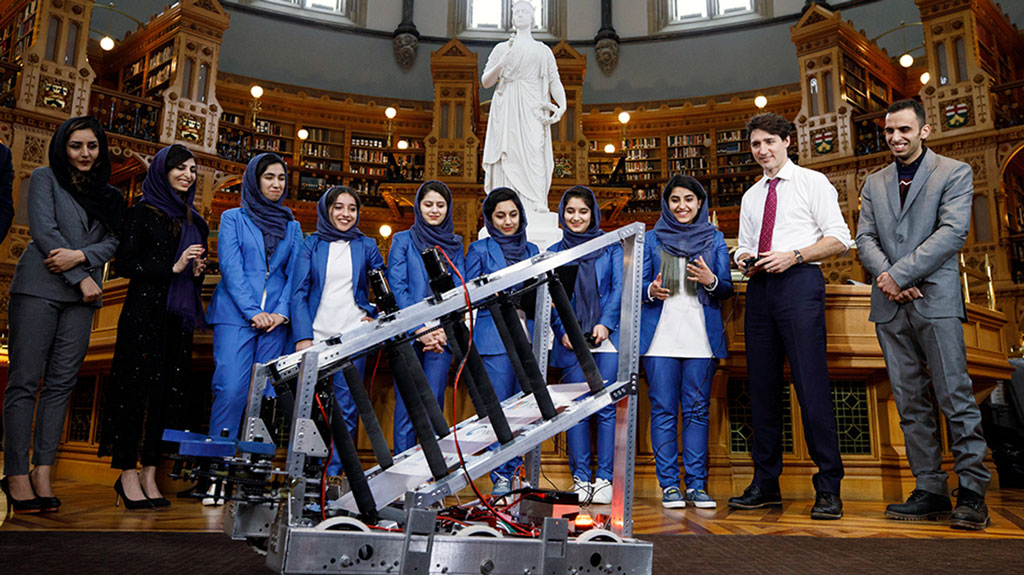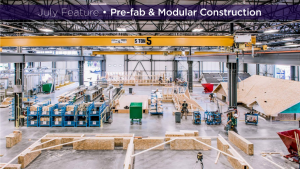Professors at Queen’s University’s Faculty of Engineering in Kingston, Ont. have issued an invitation to the Afghan Girls Robotics Team encouraging them to settle in the city.
The message was addressed to Prime Minister Justin Trudeau on Aug. 20 through a petition posted at change.org. The girls, now thought to be between the ages of 14 and 18, visited Ontario in 2018, competed in a robotics competition and met Trudeau in Ottawa.
The offer was made as the Taliban assumed control of Afghanistan, with the petitioners fearing the young scholars would suffer under the new, repressive regime.
Heidi Ploeg, Queen’s chair for women in engineering, posted the petition, which was also signed by faculty dean Kevin Deluzio and three others. Ploeg said beyond merely inviting the young women to consider a life in Kingston, she would be willing to work to find sponsorships and take other steps to assist the girls and their families.
“If we knew that they were wanting to come here and we knew what they needed to make that happen, yes, we would get involved in trying to make that happen,” said Ploeg.
“There are a lot of women, more than 20 of them, and if each of them has family members, it’s a lot of people that will need a lot of support worldwide. Maybe a few of them will come to Canada and maybe be welcomed to Kingston.
“We’ll see in the coming, probably, weeks. It will take a while.”
Ploeg said when she heard that the Taliban was back in power and contemplated the fate of the nation’s female students who might be kept from getting an education, she thought, “I can’t imagine. Their life is so different from our lives. It just makes me very sad to think about that.”
The petition to Trudeau states:
“We are contacting you with urgency to request that the Government of Canada prioritize assistance to the Afghan Girls Robotics Team members who remain in Afghanistan, some of whom you met in 2018 on their visit to Canada for a robotics competition.
“As scientists, engineers, and roboticists, these young women are our future colleagues. They need our urgent support today. With this letter the undersigned implore you to take all steps possible to ensure their safe travel to Canada.”
The girls, who billed themselves as the Afghan Dreamers, got further publicity after their trip to Ontario when it was reported they were developing ventilators out of old car parts.
The current whereabouts of the girls, some of whom were reported to have expressed an interest in coming to Canada, is uncertain. Reports have indicated some were in Qatar or in Mexico. Ploeg said she is aware through contact with a group called the Digital Citizens Fund that the girls know of the potential support from Queen’s.
“At the moment we just have to wait and see whether there are some women and their families who would like to settle in Canada or Kingston,” she said.
“From the petition, there would be a lot of support for them to make it happen. Of course there would be a lot of things that we need to do to get that working but the amount of support has been really nice.”
The Digital Citizens Fund did not return a request for information, nor did an American human rights lawyer who is reported to be representing the girls.
A representative from Global Affairs Canada did not respond to an inquiry on the case but sent a list of options for Canadians seeking to assist Afghan refugees.
As she awaits further word on the case, Ploeg said she will remain active on another program to support women in engineering, the Engineers Canada 30 by 30 initiative, which has a goal of increasing the percentage of women in the profession to 30 per cent by 2030. The Queen’s Faculty of Engineering currently has 20 to 30 per cent women enrolled which Ploeg said is “not bad” but “I think we need to be doing better.”
“It’s partly a numbers game and partly a culture game,” she said. “We need to make some changes over time. It a hard thing, it takes effort and time.”
Follow the author on Twitter @DonWall_DCN.











Recent Comments
comments for this post are closed